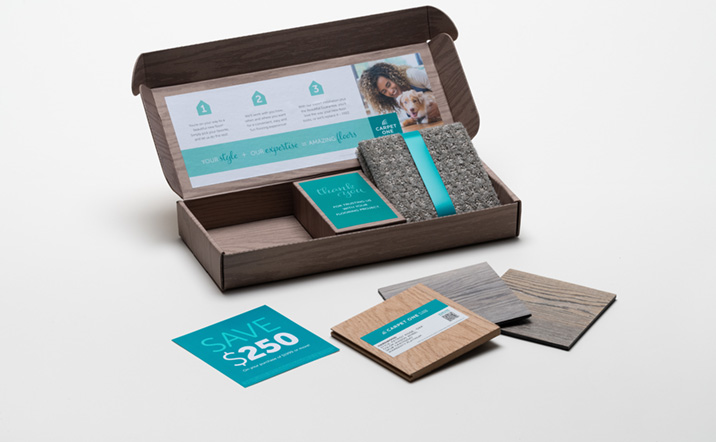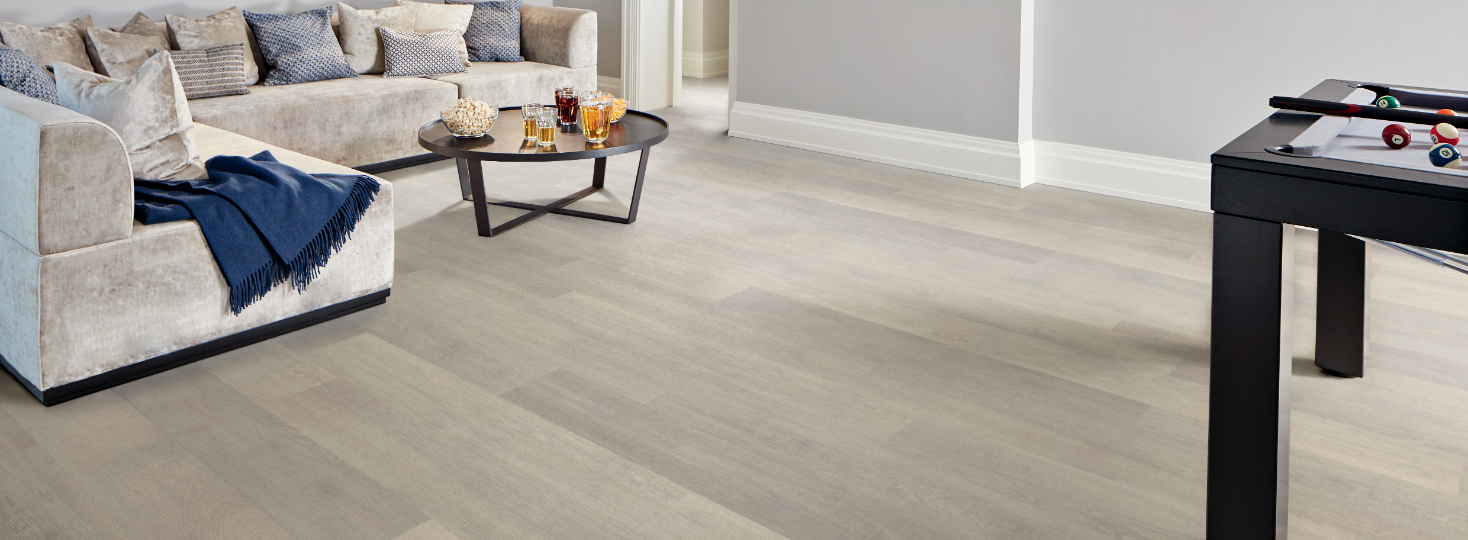

No items could be found with the selected filters.
Please try your search again.

Our designers share tips and top trends for every season. Discover your next home project with the help of our blog.

Get up to six samples delivered to your door.

Whether you’re looking for a modern look, a rustic touch, or something in between, you will absolutely love the versatility and longevity of vinyl, making it perfect for basement environments.
Vinyl flooring is an excellent choice for any basement renovation, providing both style and durability.
If you’ve decided that vinyl flooring is the right option for your home, start by finalizing the overall look and feel you want to achieve. One space may have a different aesthetic to another.
Next, you want to consider the function of a room. For example, if a room will be exposed to moisture, you want to look for flooring with a waterproof core and excellent moisture resistance to ensure a long-lasting installation. Luxury vinyl plank (LVP) flooring is a popular choice for basements due to its durability and water resistance. Additionally, choosing the right flooring for multifunctional areas like a family room is crucial to enhance the overall design and durability, especially in spaces that may serve as playrooms or gyms.
The solid core of this type of flooring is important overall as it’s an indicator of how stable and durable your floors will be. Understanding the installation process is also crucial to ensure that your flooring is laid correctly and will last for years to come.
When designing the rooms in your home, your basement isn’t always an area that lands at the top of your list, but why shouldn’t it look great? It doesn’t just need to be a laundry or storage room, it can be a functional living space.
When converting your basement, thoughtful design is essential to make the most of the area. Before starting your design, consider basement waterproofing to protect your investment and ensure a dry, comfortable living space. Whether you want to turn it into a home gym or an office, it’s one of those large spaces with a lot of potential.
Think about the aesthetic you want to achieve and choose a flooring color and style that complements your basement’s décor and creates a cozy atmosphere. From your walls and ceiling to any cabinets you’ve installed, every element in the room matters.
You also want to focus on maximizing natural light by incorporating large windows or light wells where possible, and complement with layered artificial lighting to avoid a gloomy feel.
When installing a new floor in your home, following a few essential tips can ensure a successful installation and a long-lasting result. Consider using an underlayment to provide extra cushioning and soundproofing for your new floor. Before starting, make sure the basement floor is flat and clean, as this will prevent issues during the installation. For those choosing vinyl, it works best when installed on a concrete floor, providing a sturdy and smooth foundation. Always adhere to the manufacturer’s installation and maintenance instructions to ensure the longevity of your floor. While DIY installations can be tempting, it’s recommended to hire a professional for complex or large-scale projects to save both time and effort. If you do decide to install the flooring yourself, plan ahead and set aside a few hours to complete the job. Take your time and be patient throughout the process to achieve a beautiful, durable floor that you’ll love for years to come. By following these tips, you’ll ensure a smooth installation that delivers the desired results.
Vinyl might be the perfect choice for basement floors, but what about the stairs?
Installing vinyl on basement stairs is a practical and stylish choice that offers several advantages. Vinyl is highly durable and resistant to moisture, making it ideal for basements where dampness can be an issue. Its slip-resistant surface also provides added safety, which is a must in this area.
When choosing vinyl for your basement stairs, consider selecting a thicker, textured variety to improve traction and reduce noise.
On average, high-quality flooring can last 10 to 20 years when properly installed and cared for. Its durability makes it an excellent choice for high traffic areas, ensuring it remains in good condition even with heavy use. Its water resistance, scratch resistance, and ability to withstand heavy use contribute to its long lifespan.
However, factors like foot traffic, exposure to moisture, and overall maintenance play a significant role in how long your vinyl floors will last. Regular cleaning, avoiding harsh chemicals, and placing protective pads under heavy furniture can help extend the life of your flooring, ensuring it remains both functional and attractive for years.